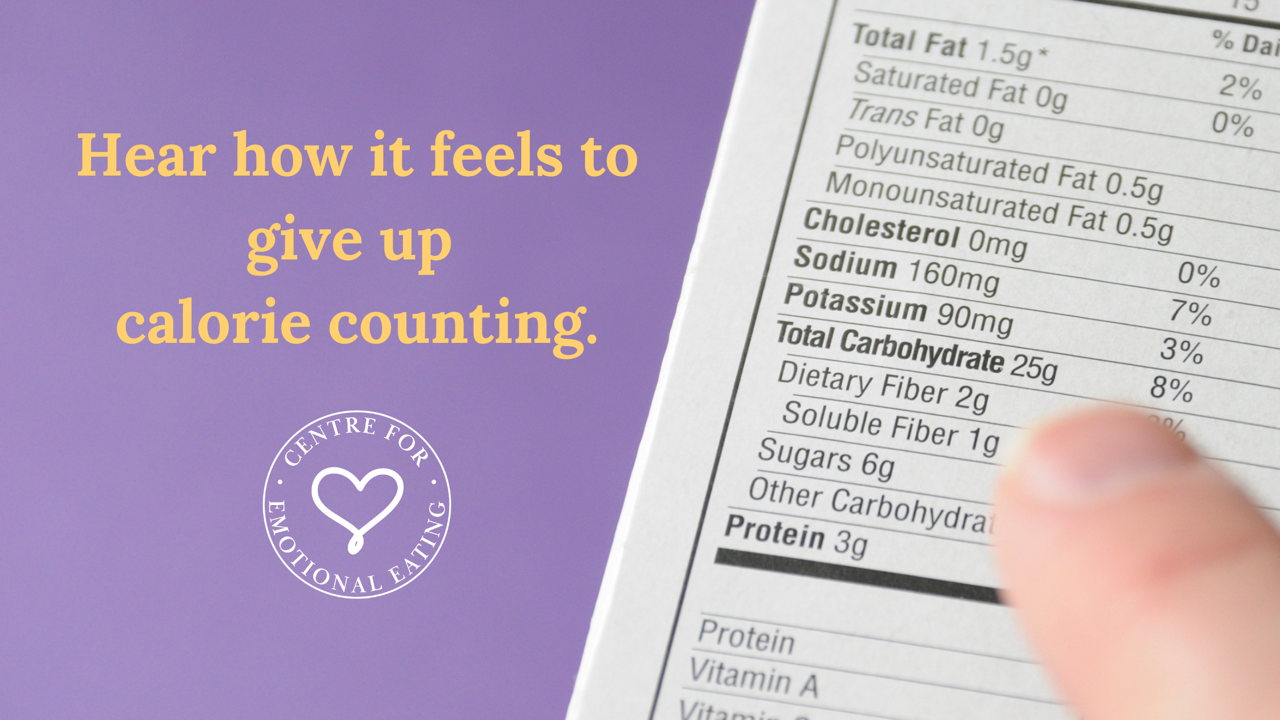BLOG
Find support not just for emotional eating, but all aspects of your well-being.
Client Insight: “I needed a plan to support myself for how I felt after a therapy session.”

If you are on your therapy journey—in one-on-one sessions, online courses like First Step, or other—we applaud you! It takes a lot of courage to open up and decide to actively work on yourself.
You might be finding that after a session you don’t feel 100%. You may walk away feeling sad, angry, exhausted or anything in between. And we want to reassure you that that is completely normal. It can be emotionally and physically draining to be vulnerable when looking at your behaviours and digging into your past trauma—some even call this feeling “a therapy hangover.”
Here’s how to not let these after appointment feelings stop you from doing this important work. Many clients have shared that there are specific things they do to give themselves comfort.
- Book your appointment or time for your online course at the end of your work day. This means you don’t have to shift back into a work headspace immediately after, putting back on a “I’m fine” mask in front of others. If you can’t schedule ...
Tips to Feel Your Best During Bathing Suit Season

The summer ‘uniform’ is made up of shorts, tank tops, and sweating! All can make you feel uncomfortable if you struggle with body image. But perhaps the most dreaded of all is the bathing suit. At some point we go from children who love being in the water and playing in the sand without a second thought, to worry-charged and self-conscious adults who will actively avoid situations that require suiting up.
If this sounds like you, you’ll want to bookmark this post to come back to when you’re faced with a bathing suit event. Here are 4 tips to make you feel more comfortable (dare we even say confident!):
- You’ve heard it before but it bears repeating: no one is as concerned about your appearance as you are. We in no way want to discount experiences where someone something commented on your body. No one gets to do that and here’s what you can do if it happens. But we can be our own worst enemy when it comes to criticizing ourselves. Consult someone you trust, a partner or friend, who c ...
4 Spring Cleaning Tips For Your Mental Health

Have you ever noticed that when you wipe down the kitchen you immediately feel a sense of calm? Or maybe you love to light a candle during the cold, dark winter months. These are great examples of how small alterations to your environment can boost your mood in seconds. And we recommend finding more ways to add these things to your every day! It is a great way to tailor your environment, stack the deck if you will, to bring more joy and relaxation into your daily life.
You might think: “I don’t have the budget to upgrade my house!” While of course we’d all love to decorate or renovate our homes to fit our ideal dreams, you don’t have to go all out (and drop a lot of money) to see mental health benefits. You can try:
- Sparkle and shine. Let’s face it: cleaning the entire house feels overwhelming! Instead, shift your focus and make it your goal to clean only one room in your house. We suggest choosing the one you spend the most time in, so you get the most recharging bang for your buc ...
Client Insight: “It was scary, but I’m glad I stopped counting calories.”

The following blog posts talks about calorie counting in some detail. If this is something that might bring up negative feelings for you, please skip this post to protect your mental and physical health. 💛
After eating emotionally you might be thinking you need to do a complete 180 and get really strict about what and how you’re going to eat next. A common way to feel in control of your eating is to count your calories. It’s become so easy these days as the diet industry has created apps that are always in the palm of our hands and can even scan labels!
Often clients will be able to white knuckle their way through a few days of eating low calorie only to find themselves binge eating at the first sign of stress, alone time, or even faced with a dinner they can’t ‘log’. And it can feel like being right back where you started after the initial overeating episode.
Very often it feels scary to let go of counting calories, but doing so can bring you back in-tune with your body in a way yo...
What is Body Checking?

It might feel normal to pass by a store window and check out your reflection. But if you’re noticing more than simply adjusting your scarf or hat, you might be falling into body checking.
Body checking is any way you monitor your body’s appearance. This might look like:
- Pinching or pulling at skin to temporarily manipulate how your body looks.
- Examining your stomach in the mirror while trying to “suck in” as much as possible.
- Stepping on the scale often.
- Taking photos of your body constantly, swearing they will be your “before” photos.
- Comparing your body now to one you had as a teenager or to others around you.
You might even notice that these habits become even more frequent when you are stressed, feeling sad, or even just about to go on vacation! The issue with body checking is that you’ll never feel like you are measuring up to whatever you’re hoping for because it is a way of constantly critiquing your body. The diet industry doesn’t help us at all! Even if it changes i...
Client Insight: “I cleaned out my ‘skinny’ clothes from my closet and I love the result.”

For many of you who have been on the diet rollercoaster for years, you probably have collected two wardrobes: one you’re trying to feel good in now and the other is the clothes you hope to fit back into one day. You might even find yourself putting off buying clothes you feel your best in because you’re waiting to lose weight and don’t want to ‘waste’ the money.
Here at the Centre for Emotional Eating we hear this from clients often! Not only is there a wish to one day be the smaller size you were previously, a lot of the time you also have emotional ties to those clothes because of who you were when you wore them. For example, one client loved her blouses and pencil skirts because it reminded her of a time when she was happy in her career.
But getting rid of these clothes will not only free up real space in your closet it will also free up mental space. Here’s what we hear from clients once they’ve taken the plunge and cleaned out their closets of clothes that no longer fit them or ...
3 Good Things That Can Come from a Binge

Binge eating feels all encompassing. You feel helpless to stop what and how much you are going to eat, and chances are you are doing it in the moments where you are alone. Here are three signs you may have missed during a binge and how to feel better prepared the next time this urge comes up for you:
- That moment when you decide to give into a binge, even when you know it won’t make you feel good in the long run, is actually a good sign. Even if you continue with the binge, you’ve made a mental note that there is an ‘after’ to the binge. We are absolutely not applauding the guilt and shame that comes post-binge but knowing that you are going to get through the binge is the beginning to being able to think beyond it—showing you’re not so afraid of what life might send your way next!
- What do to next: tell yourself, out loud even, that “I am going to get through this.” Speaking to yourself in this way creates a kind of pep talk that can allow some positivity (and even empowerment) co ...
What is Body Neutrality? (And How it Can Help You)

There is a big movement, especially on social media, to be body positive. It is the idea that you feel positive about your body—embracing how it looks, how you feel in it—most of the time. It is meant to lead to more self-confidence, self-love, and total acceptance of your weight, which all sounds great!
… But what if you’ve spent years absorbing diet culture messaging? Or you eat emotionally and that leads to feelings of shame and guilt around your body? It can seem impossible to get to a place where you unconditionally love your body and actively feel positive about it.
This is where the idea of body neutrality comes in.
Being “neutral” about something means you don’t have any positive or negative feelings about a topic, it simply is. This is something you can apply to how you feel about your body. If you constantly beat yourself up after going clothes shopping or suck in your stomach every time you look in a mirror, you might find ALL your ideas around your body are negative. The...
What to do When You’re Feeling Lonely During the Holidays

The holiday season often feels like it is an emotional minefield. It can bring up memories of our childhood or longer hours at work. It can exacerbate anxiety with the increase in social situations or kick perfectionist into high gear when we decorate, plan, and host.
But one of the most painful emotions to come up during the holidays can be loneliness. We’re reminded of family we’ve cut ties with or loved ones who have passed away. Maybe even friends you once would have celebrated with are no longer close by. And it isn’t always a physical distance, sometimes we may feel like we’re not relating to our community as they manage their own holiday stressors and expectations. For a season that is about connecting with others, it can really hit home that our family and friends’ groups have gotten smaller or busier.
While feeling lonely during the holidays might not be entirely avoided, there are ways to plan and manage it, so it feels less like a rollercoaster you can’t get off until Jan...
5 Powerful Tips for Dressing During the Holidays

As the holiday season gets closer, it seems like invites for family, friend, and work events are rolling in non-stop. And dressing for an event can sometimes feel like putting on the armour before a battle. You consider the weather, if you’ll sweat through a fabric, if your jeans are fresh from the dryer and need to be stretch back out. You might always find yourself reaching for the same clothing items: black and drapey.
But we’re here to encourage you to use your clothing as a way to get a confidence boost! Here are five insightful tips to help you find clothes you love and feel your best in:
Be you, boo! First things first, find out what your personal style is without thinking about how something might look on your body (all black clothing “because it’s slimming” isn’t an option here). Are you called to soft yellows and greys, or do you love a splash of fuchsia against classic navy? While brand websites might feature only thin models, this is actually an area where social media ha...


